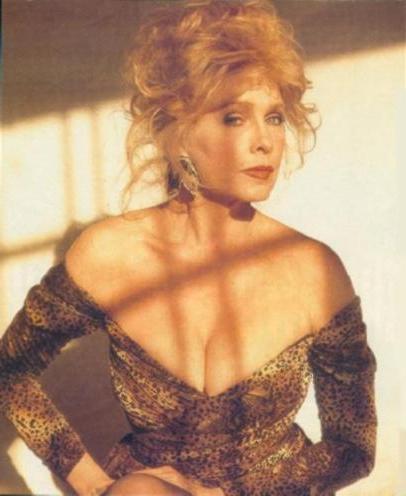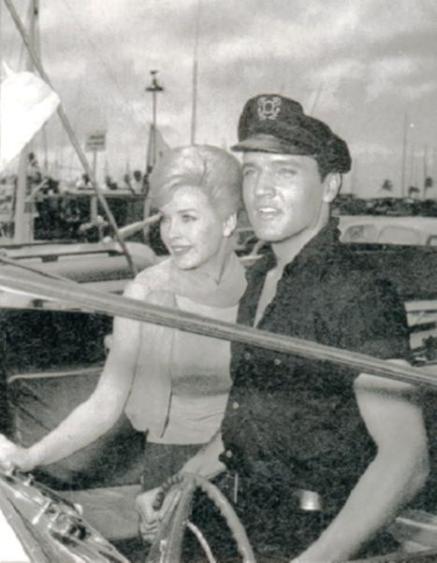By Joan Mac Trevor, Ciné Télé Revue, 1990
|
|
Home | Cette page en Français |
| «Nowadays, women are stronger than men !» | |||||
|
By Joan Mac Trevor, Ciné Télé Revue, 1990 |
|
||||
 Once
launched, Stella Stevens is inexhaustible. Naturally voluble and fundamentally
optimist, she has never considered the eclipse of her career, at the
beginning of the Seventies, like a curse. At most like a purgatory. Today, she
cannot be anything else than satisfied with the gift that makes the destiny to
her : the
role of Phyllis, the mother of Gina, in the famous soap Santa
Barbara. A two year old contract, which will
assert
her a treatment of queen, insofar as her character will not cease becoming
substantial. "Let
us expect that they will not kill her !" she sighes, making allusion to the
annoying practice of some producers to eliminate a character, and consequently
its interpreter, when it seems worn to them. Stella Stevens is not at
her beginnings in the TV soaps. In
1981, she was Lute-Mae Sanders, the owner of a brothel in Flamingo
Road. But Santa Barbara is her first "
full-time " soap : a daily presence, which enables her to live more narrowly with
Phyllis.
Once
launched, Stella Stevens is inexhaustible. Naturally voluble and fundamentally
optimist, she has never considered the eclipse of her career, at the
beginning of the Seventies, like a curse. At most like a purgatory. Today, she
cannot be anything else than satisfied with the gift that makes the destiny to
her : the
role of Phyllis, the mother of Gina, in the famous soap Santa
Barbara. A two year old contract, which will
assert
her a treatment of queen, insofar as her character will not cease becoming
substantial. "Let
us expect that they will not kill her !" she sighes, making allusion to the
annoying practice of some producers to eliminate a character, and consequently
its interpreter, when it seems worn to them. Stella Stevens is not at
her beginnings in the TV soaps. In
1981, she was Lute-Mae Sanders, the owner of a brothel in Flamingo
Road. But Santa Barbara is her first "
full-time " soap : a daily presence, which enables her to live more narrowly with
Phyllis.
Stella Stevens is born in Hot Coffee, Mississippi, in 1939. Amusing geographical characteristic, which had made say to the famous Hollywood gossip Louella Parsons that she was "the cream of Hot Coffee". But how a daughter of farmers of a small village from Mississippi has one day decided to become a star ? "Everything is the fault of Giulietta Masina, the wife and the inspirer of Federico Fellini", she acknowledges with a malicious wink. "I went to see La Strada in a cinema in Memphis. And I will always remember this little face of clown, and the facility with which she passed from comedy to tragedy without pronouncing a word. Only by the way of rolling the eyes and of moving the lips. This scene inspired me. And, since then, I never ceased wanting to be an actress."
Stella Stevens knew the last years of the golden age of cinema, at the time where the actors were still taken under contract by a studio. Thus she passed from Fox to Paramount, and from Paramount to Columbia. Savagely independent, she however can appreciate the advantages of "the star system" while acknowledging her pleasure of carrying out her career freely. "The contract, it was the security. But too much security harms the work of an actor. At Paramount, I was paid at the week, that I turn or not. It is debilitating for an actor. For everyone besides. Money should remain the reward of work. Moreover, the studio refused all the proposals of films which came to me from outside. They did not want to lend me, even for the time of a movie. I cried about it from rage. I did not regret the end of the star system. The only nostalgia that I allow me, it is the loss of glamour."
The nostalgia of glamour, it is what makes of Stella Stevens the relative of Joan Collins and Jane Wyman. The majority has known the star system, a little of them has regretted its disappearance, but all maintain in their maintenance and their clothing this flamboyance and this ostentation from another age, that the studios had learned to them. To such a degree that when Darryl Estrine, the photographer of the Onyx agency, who realized the photos session in exclusiveness for Ciné-Télé-Revue, asked Stella Stevens if she wished to appear natural on the photos, she exclaimed, almost made schocked : "Hey ! No. Spare that to me ! I certainly want to be beautiful, glamourous, but not natural." A cry which is better than all the consents. "The default of glamour" she improves, "it is that, in our world, there is not enough of it. Fortunately, in Hollywood, one does not have to complain too much. It is all the difference between an actor from the East coast and an actor from the West coast. In New York, an actor walks in jeans full of holes, the hair in battle and the tired pullover. In Los Angeles, the make-up men and the technicians are still better equipped than the actors."
Not very inclined to dwell too long on the past, Stella Stevens knows well that in thirty years the image of woman has changed and that it is not question any more of returning to the time where she was just a fragile heroin always waiting for a protective male. "Today", she says, "men are weaklings. We are much more solid than them. And our role in life is all the more difficult to face."
Stella Stevens is however not without model, and it is not a chance if the stars she had formerly admired have as a name Lana Turner, Ava Gardner and Brigitte Bardot. When one opposes to her that Lana Turner was a star without being necessarily an excellent actress, she flies to the help of her inspirer by claiming that the play is not the main point, but well the little something else than only a star can bring. One will not baffle her on this point. Lana Turner is a star, and it would be necessary to be insincerely to support the opposite. As for Brigitte Bardot... "She never disappointed me", she acknowledges willingly. "I had never seen as much sensuality in a woman. There is a scene in Love is my Profession which will always remain me in memory, when B.B. sets her skirts off in front of Jean Gabin, on a corner of table. Without showing anything, only while suggesting. It is the sexiest scene I ever saw in a film. But such women are unthinkable nowadays. It is necessary to be a star of the size of Cher or Diana Ross to be credible."
 At
the time when she formed part of the great Hollywood, Stella Stevens had been likely to
play with the greatest ones. She had in particular presided over the beginnings of Bobby Darin
in John Cassavetes' Too Late Blues, in
1961. "It is the most beautiful memory of my career", she acknowledges. "Not
much as the shooting itself as my stay in Paris, where I had been
invited to present the film at the Cinémathèque. I never went again to Paris,
but I preserve the hope to return to there one day."
At
the time when she formed part of the great Hollywood, Stella Stevens had been likely to
play with the greatest ones. She had in particular presided over the beginnings of Bobby Darin
in John Cassavetes' Too Late Blues, in
1961. "It is the most beautiful memory of my career", she acknowledges. "Not
much as the shooting itself as my stay in Paris, where I had been
invited to present the film at the Cinémathèque. I never went again to Paris,
but I preserve the hope to return to there one day."
And Elvis Presley, with who she played in Girls ! Girls ! Girls ! in 1961 ? "It is the only one of my films that I never saw", does Stella Stevens with a point of bad mood, as if a taboo subject had been evoked. "The director (Norman Taurog) and the producer (Hal Wallis) humiliated me and treated me in a way so much degrading that I swore myself to never watch this film again. It is the most painful memory of my career." But Elvis Presley ? "He was OK", releases Stella without much conviction. "But he did not have many things to say with Colonel Parker always at his sides. He has given to me from the start the impression of a boy who could not make decision. As I was always very independent of spirit, and that the situation shocked me, I said to him that he had the qualities to be a great actor if only he does not throw himself in the first musical thing that one proposed to him. He took it very badly. "What is bad in success ?", he answered me, believing that I had criticized him. I did not insist."
If Stella Stevens remains a familiar figure to the eyes of the younger generation, she owes it to her role of Miss Purdy in The Nutty Professor, film in which she was the partner of the unbelievable Jerry Lewis. "It is so often aired on TV that it became my mark", she recognizes. "Besides, Jerry has recently recontacted me, to play a sequel."
Married at fifteen years old and mother at sixteen, Stella Stevens is also the mother of Andrew Stevens (Dallas), the ex-husband of Kate Jackson. Towards the end of the Fifties, shortly after her divorce, her eagerness to obtain the guard of her child and the attemps of kidnapping perpetrated by the father on the person of Andrew had fed, during many months, the gossips of the capital of the cinema.
Stella Stevens was never shown miserly of her charms. She posed naked for Playboy in 1959 and however does not show any embarrassement about it. At most she wishes that one not refer constantly to that. "Fox had put and end to my six months contract and I had to eat. I was proposed three thousand dollars to pose naked. I accepted." It is useless to specify that her volcanic nature is not opposed at all to sex on television and cinema. "How can sex be harmful ?", she wonders with a certain logic. "Nobody has badly turned to have made love too much. Moreover, on television, the audacities are very wise. On the other hand, I am resolutely opposed to violence. It always corrupt the one who looks at it. And, while watching it, it becomes acceptable."
It will have been understood that Stella Stevens does not wait until one proposes a role to her to be happy and live her life of woman fully. When she does not devote to her passion of photography, she shoots some documentaries. She even directed her own son in a film entitled The Match. "When I look again at the film of my life", she adds, "I think that I had everything I wished : maternity, friends, a family, a beautiful career... Not as extraordinary as I would have wished it, but, for a little country-woman from Hot Coffee, it is a beautiful success. Everything that arrives to me now, I regard it as a gift."